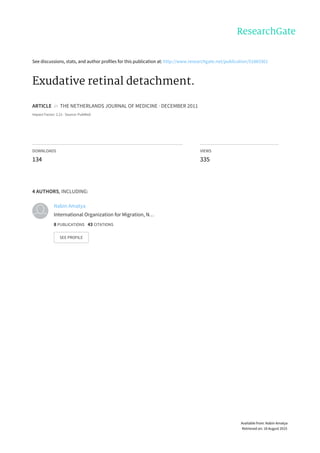getpdf
- 2. 527 n o v e m b e r / d e c e m b e r 2 0 11 , v o l . 6 9 , n o 11 ÂĐ Van Zuiden Communications B.V. All rights reserved. On 6 February 2010, a 50-year-old female patient was admitted to a local hospital complaining of sudden dropping of the left eyeâs visual acuity. B-scan ultrasonogram showed retinal detachment but failed to demonstrate a solid subretinal mass. A few days later, the same patient complained of hoarseness of her voice. On 6 March 2010, the otolaryngologist found paralysis of the left vocal cord, through the laryngoscope. The patient was referred to our hospital for the blurred vision of the left eye and hoarseness of her voice. Her visual acuity was 20/20 in the right eye and HM/5 cm in the left eye. Ophthalmoscope revealed exudative retinal detachment (figure 1). Contrast- enhanced CT scan confirmed an enhanced lesion on the temporal side of the left eyeball with a dense central area. Ultasonography showed a mass of about 21x8 mm, 7 mm thick, without acoustic shadowing or gradual decay (figure 2). Meanwhile, the ribbon-shaped hyper-zone between the papilla optica and para-lens were seen. On 9 April 2010, the patient developed a lung infection; computed tomography (CT) of the chest demonstrated a mass in the hilum of left lung (figure 3). The biopsy was performed and the histopathology examination confirmed that the mass was small lung cell carcinoma. P h o t o qu i z Exudative retinal detachment M. Zhu1 , A. Tang2 , N. Amatya3 , L. Qiu1* Department of Diagnostic Ultrasound, Ophthalmology, Radiology, West China Hospital of Sichuan University, Sichuan, China, * corresponding author: tel.: +86 02881899311, fax: +86 02885423192, e-mail: zhumengjiaoer@yahoo.com W h a t i s y o u r d i a g n o s i s ? See page 530 for the answer to this photo quiz.w Figure 1. The exudative retinal detachment on the temporal side of left eyeball without retinal tears Figure 2. Sonogram of the lesion with hyperecho ribbon-shaped Figure 3. Enhanced chest computed tomography revealed a large mass in the hilum of the left lung. The mass was diagnosed as small cell lung cancer by bronchoscopic biopsy
- 3. 530 n o v e m b e r / d e c e m b e r 2 0 11 , v o l . 6 9 , n o 11 ÂĐ Van Zuiden Communications B.V. All rights reserved. DIA G NOSIS Symptomatic choroidal metastases from lung cancer are only found in a minority of patients.1 Visual loss with retinal detachment is a rare clinical complication of small cell lung cancer.2-4 To our best knowledge, this patient is unique in that she had choroidal metastases and exudative retinal detachment as the presenting sign of small cell carcinoma of the lung. The lesion radiologically mimics choroidal melanoma complicated with retinal detachment. The diagnosis is confirmed by bronchoscopic biopsy of the mass, which is shown to be small lung cell carcinoma through histopathology examination. The patient responded to systemic chemotherapy and radioactive plaque therapy. It should not be ignored that choroidal solitary mass might also originate from the lung. The aetiology and nature of the lesion should be well investigated, in particular when the vision loses expeditiously within a short period. A n s w e r t o ph o t o qu i z ( pa g e 5 2 7 ) Exu d a t i v e r e t i n a l d e t a chm e n t R e f e r e n c e s 1. Shields CL, Shields JA, Gross NE, Schwartz GP, Lally SE. Survey of 520 eyes with uveal metastases. Ophthalmology. 1997;104(8):1265-76. 2. Leys A. Choroidal metastasis and retinal pigment epithelial tear in a patient with small cell lung carcinoma. Retina. 2000;20(2):216-7. 3. Fernandes BF, Fernandes LH, Burnier MN. Choroidal mass as the presenting sign of small cell lung carcinoma. Can J Ophthalmol. 2006;41(5):605-8. 4. John VJ, Jacobson MS, Grossniklaus HE. Bilateral choroidal metastasis as the presenting sign of small cell lung carcinoma. J Thorac Oncol. 2010;5(8):1289. Dabigatran etexilaat (PradaxaÂŪ , Boehringer Ingelheim) is een nieuwe orale directe, reversibele trombineremmer die sinds enkele jaren wordt gebruikt voor primaire preventie van veneuze trombo-embolische (VTE) aandoeningen bij volwassen patiÃŦnten na een electieve totale heup- of knievervangende operatie. Sinds augustus 2011 is het middel tevens geregistreerd voor de preventie van beroerte en systemische embolie bij patiÃŦnten met atriumfibrilleren*. Momenteel bestaat nog relatief weinig klinische ervaring met dabigatran bij atriumfibrilleren. Echter, artsen worden in toenemende mate geconfronteerd met patiÃŦnten die dit middel gebruiken, waarmee zij voor nieuwe klinische situaties kunnen komen te staan. Om artsen bij deze soms nog ongewone klinische situaties te ondersteunen heeft een multidisci- plinaire klankbordgroep van medisch specialisten het Zakboek dabigatran ontwikkeld. Dit zakboek vormt een praktische leidraad bij bijzondere vragen en situaties die zich kunnen voordoen tijdens het gebruik van dabigatran. Zo worden onder meer pragmatische adviezen gegeven over hoe te handelen bij noodsituaties zoals acute chirurgische ingrepen, bloedingen of een verdenking op overdosis. Door de insteek vanuit de dagelijkse praktijk vormt het Zakboek dabigatran een nuttige aanvulling op de reguliere productinformatie. Gebruik van de leidraad wordt dan ook van harte aanbevolen aan alle artsen die vanuit hun specialisme in aanraking kunnen komen met patiÃŦnten die worden behandeld met dabigatran. Prof. dr. H.R. BÞller, internist AMC Amsterdam en voorzitter Klankbordgroep dabigatran Meer informatie Het Zakboek dabigatran is online beschikbaar en aan te vragen via www.zakboek-dabigatran.nl. *Non-valvulair atriumfibrilleren en ÃĐÃĐn of meer risicofactoren ONLAN G S V ERS C H ENEN Zakboek dabigatran Een leidraad voor gebruik in bijzondere situaties



